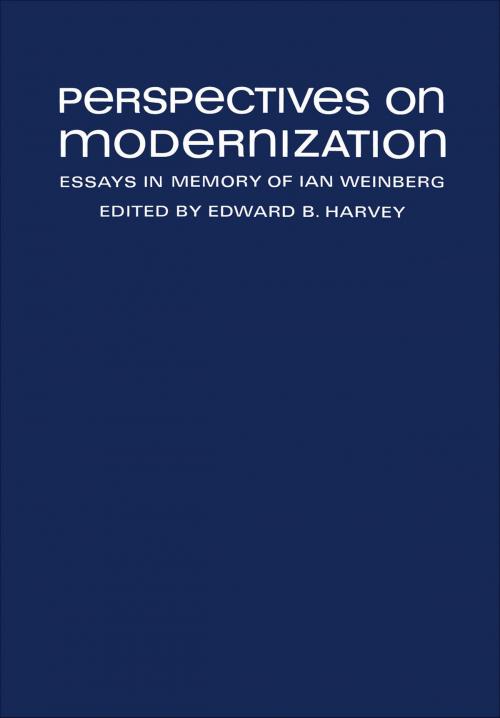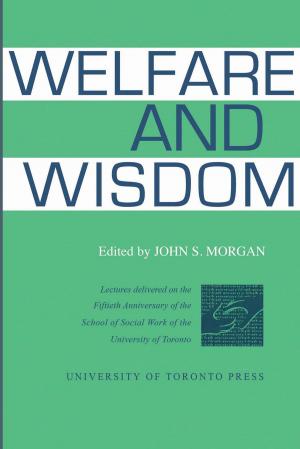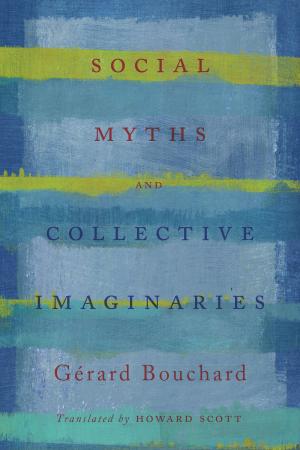Perspectives on Modernization
Essays in Memory of Ian Weinberg
Nonfiction, Social & Cultural Studies, Social Science, Sociology| Author: | ISBN: | 9781487589868 | |
| Publisher: | University of Toronto Press, Scholarly Publishing Division | Publication: | December 15, 1972 |
| Imprint: | Language: | English |
| Author: | |
| ISBN: | 9781487589868 |
| Publisher: | University of Toronto Press, Scholarly Publishing Division |
| Publication: | December 15, 1972 |
| Imprint: | |
| Language: | English |
Perspectives on Modernization is published in memory of Ian Weinberg, a sociologist of brilliant promise who died at the age of thirty. It consists of essays by his colleagues, students, and teachers which reflect upon and carry further Ian Weinberg's major scholarly concerns – the processes of industrialization and modernization of societies.
The book begins with an essay by Ian Weinberg which was presented at the annual meeting of the American Sociological Association, 1968. It is followed by a paper of wide scope and interest, Wilbert E. Moore's 'Normative Conflict in Stages of Cultural Change.' Noting that the study of rapid social change can no longer be confined to the so-called modernizing countries, Moore argues that comparable normative conflicts occur at comparable stages of cultural change. Rainer C. Baum and Charles Tilly are concerned with the serious gaps in the theory of modernization and politics. Baum is specifically concerned with developing a political analogue to the theory of economic development; Tilly concentrates on a longitudinal study of the relationship between modernization and collective political conflicts. S.D. Clark writes of patterns of urban growth, looking at two exceptions to the well-studied outward movement of immigrants in Canadian cities. Edward Shorter studies the modernization of sexual attitudes by analysing illegitimacy. The last three papers approach modernization through economic changes and development: H. Nishio analyses the relationships between political control and economic development in Japan over two centuries; Stanely R. Barrett studies the transition of the economy in a Nigerian utopian community from communalism to partial private enterprise; and L.R. Marsden, E.B. Harvey, and J. Bulcock explore the relationship of literacy and economic development in thirty-nine African countries. The volume includes an introduction by the editor and an outline of Ian Weinberg's short but brilliant career.
These essays are, like the work of the man they seek to honour, wide ranging and intellectually provocative in their approach to a complex question. The volume is a fitting tribute to both the man and the spirit of intellectual vitality to which he was committed.
Perspectives on Modernization is published in memory of Ian Weinberg, a sociologist of brilliant promise who died at the age of thirty. It consists of essays by his colleagues, students, and teachers which reflect upon and carry further Ian Weinberg's major scholarly concerns – the processes of industrialization and modernization of societies.
The book begins with an essay by Ian Weinberg which was presented at the annual meeting of the American Sociological Association, 1968. It is followed by a paper of wide scope and interest, Wilbert E. Moore's 'Normative Conflict in Stages of Cultural Change.' Noting that the study of rapid social change can no longer be confined to the so-called modernizing countries, Moore argues that comparable normative conflicts occur at comparable stages of cultural change. Rainer C. Baum and Charles Tilly are concerned with the serious gaps in the theory of modernization and politics. Baum is specifically concerned with developing a political analogue to the theory of economic development; Tilly concentrates on a longitudinal study of the relationship between modernization and collective political conflicts. S.D. Clark writes of patterns of urban growth, looking at two exceptions to the well-studied outward movement of immigrants in Canadian cities. Edward Shorter studies the modernization of sexual attitudes by analysing illegitimacy. The last three papers approach modernization through economic changes and development: H. Nishio analyses the relationships between political control and economic development in Japan over two centuries; Stanely R. Barrett studies the transition of the economy in a Nigerian utopian community from communalism to partial private enterprise; and L.R. Marsden, E.B. Harvey, and J. Bulcock explore the relationship of literacy and economic development in thirty-nine African countries. The volume includes an introduction by the editor and an outline of Ian Weinberg's short but brilliant career.
These essays are, like the work of the man they seek to honour, wide ranging and intellectually provocative in their approach to a complex question. The volume is a fitting tribute to both the man and the spirit of intellectual vitality to which he was committed.















